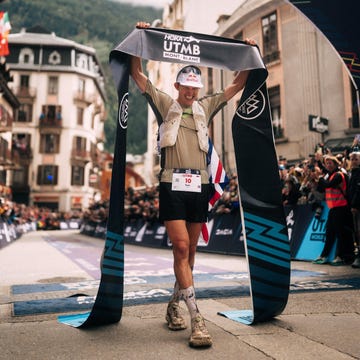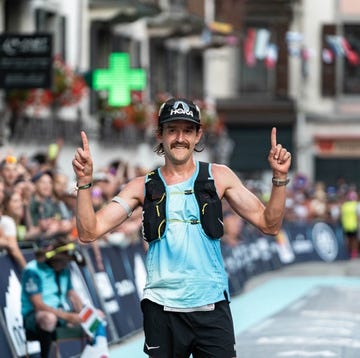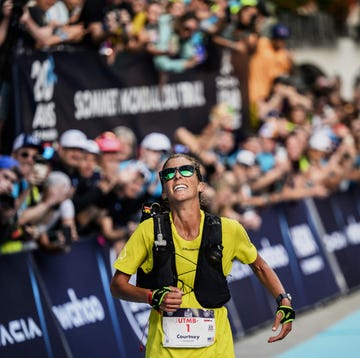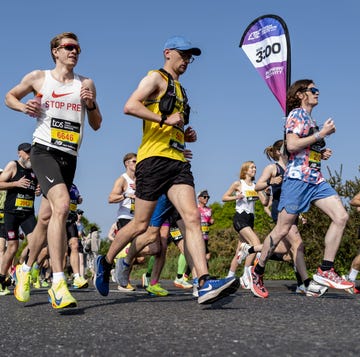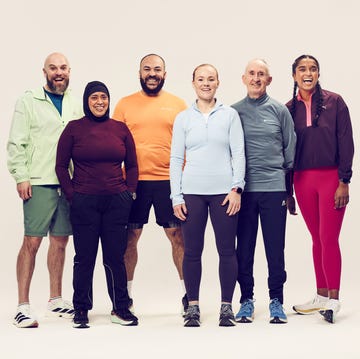First, the bad news. Globally, sport is responsible for an estimated 350m tonnes of greenhouse gases (CO2e), about the same as Spain. While running isn’t as planet-wrecking as football (which produces equivalent emissions to Denmark) or Formula One, the Olympic Games creates around 2m tonnes of CO2e. A big city marathon can release the same planet-heating emissions as the lifetimes of 35 people, and the global trainer industry creates as much pollution as the entire UK.
Climate breakdown is now affecting running: flooding put a stop to this year’s English National Cross Country Championships, while the 2023 Twin Cities Marathon in Minnesota was cancelled because of excessive heat. There are also the issues caused by the silent killer that is air pollution. And IAAF president Seb Coe has admitted that future Olympics may not feature a marathon.
But the good news is that nothing connects people like sport does. The global spectacle attracts not just people’s attention, but their tears of heartbreak, their roars of triumph, their passion, their engagement. And a recent study found sportspeople are the most influential people of our time. We’ll hear from some of them in a moment...
What everyone's reading
So, what can we do? Reducing how much we fly and buying less kit and making it last longer are the two big individual actions runners can take, with consuming fewer animal products a third to consider.
I used to fly three times a year for running but now only do so once (ideally not at all), and I’ve discovered more local races and challenges, saved money and spent more time with my kids. In using my shoes for at least 1,000 miles and learning how to repair them with Pair Ups patches, they’ve become special items with more memories. In becoming vegan, I get to annoy everyone who isn’t. However, collective action will have more impact and is more fun – and that’s why The Green Runners community was born.
There are now well over 1,000 Green Runners around the world. You don’t have to be perfect, or have a stupid haircut like mine. We push for individual and collective action, focusing on four pillars: how you move, how you kit up, how you fuel and how you speak out. You simply pledge to improve on at least one of them. We’ve teamed up with England Athletics and other organisations, had success in calling out sportswashing and were nominated for a BBC Green Sport Award.
We’re losing the race against climate breakdown, butt here’s still just about time to turn things around and run towards a fitter planet. A great example of using running for change is the Running Out of Time Relay (running-out-of-time.com), which returns this June, from Ben Nevis to Big Ben. Please come and join us!
In the meantime, I’d like to introduce you to eight of the greenest runners, who are leading the way towards a sustainable future in which we can all continue to enjoy every step we take on this beautiful runner’s world of ours.
Jasmin Paris
The Barkley Marathons finisher declined to represent GB at the 2022 World Mountain and Trail World Championships in Thailand because it would involve a flight, has turned down sponsorship, uses public transport to travel to European races and is a Green Runners co-founder.
‘I remember writing about deforestation in the Amazon when I was at primary school and feeling sad,’ says Paris. ‘A more acute realisation of how urgent the emergency is has come in the past four years, partly through having children of my own and thinking of their future and seeing the effects of climate change playing out in real time.
‘Sport has so many physical and mental health benefits and provides common ground, which bridges the gap between societies and cultures. So while there’s no doubt that we need to address its impact (and travel to events in particular), I think we should be using sport – the passion and the commonality – to help motivate and unite people in the fight against climate change.
‘The Green Runners was a way to start addressing my climate worries with something positive and proactive ,starting within the running community – which is close to my heart and largely shares the same values, such as appreciation of the natural world.
‘I think The Green Runners has been a great source of information and inspiration for those seeking to lessen their running (carbon) footprint. It has also provided a route for people to speak out. One of the greatest success stories so far was the Ditch Dacia UTMB anti-sportswashing petition, which was signed by thousands of runners across the world.
‘Ultimately, we all need to travel less, and to do so by more sustainable means (not flying) if possible. I’m a hypocrite in some respects – flying to the US for the Barkley Marathons is my biggest guilt – but I’d rather be that than silently do nothing when there’s still time. If everyone who flies six times a year to races switches to flying once, that’s a huge difference. It’s better to be imperfect and trying than to make no effort at all. Besides that, we should be buying far less kit, especially shoes. The industry needs to focus on well-made kit that can be repaired, the exact opposite of the recent ‘single-use’ shoes.
‘We still have time to act, to shape the future of our sport, for example by saying no to oil-related sponsors for the big events. We need to keep trying. Ultimately, the big industry players (events, brands) respond to what consumers want. So if we act collectively to demand a more sustainable future for our sport, the providers will have to change to fit that vision.’
Innes Fitzgerald
Nicknamed ‘the Greta Thunberg of sport’, FitzGerald made headlines in January 2023 when, aged 16, she turned down the opportunity to represent Great Britain at the World Cross Country Championships because it would mean flying to Australia. The vegan, U20 European Cross Country Champion lives in a passive house (with no heating/cooling system) in Devon and is the BBC Green Sport Awards 2023 Young Athlete of the Year.
‘When I qualified for the Championships, I already knew I wasn’t going,’ says FitzGerald. ‘I had to do something to make sure people are aware of the climate emergency. I’m uncomfortable flying in the knowledge people could be losing their livelihoods, homes and loved ones as a result. If I never flew, though, it would harm my career as I simply couldn’t get to the biggest events. I get public transport across Europe when that’s practical, and might take a rare flight when that really feels like the only choice.
‘I recently started crossing my arms at race finish lines, a small gesture to say no to unnecessary private jets. It’s hard to say things without seeming hypocritical, but no one can be perfect. It’s blindingly obvious that flights need to be reduced. I want someone to address the elephant in the room and talk about the top 1%, the private flights taken purely for leisure.‘The Australia decision had an overwhelming response,with lots of media interest. I wasn’t expecting that at all. But it shows that we can make our stories heard if we do the right thing. It’s given me confidence that, as sportspeople, we can make a difference. We can do things that can create change.
‘I hope more athletes will begin to question their choices, but I can understand why they don’t. If you have one extra stress to deal with, whether that’s the media or taking a stand on something, you’re putting yourself at risk of not performing at your best.
‘We don’t think enough about how we can work together to solve problems. It shouldn’t all be on individuals. The way the sport is run is part of the problem and there are definitely frustrations there. Event locations are always tricky, because if they’re close to one person, they’re far from another. But with world events, it’s how often they hold them and putting high importance on specific ones, so athletes don’t have to travel to loads and loads of different ones. We should be creating a calendar in a way that means we’re not trekking halfway across the world all the time.’
Lindsay Buck
The ‘Wasdale Womble’ climbs Scafell Pike, England’s highest mountain, every day, plogging as she goes.
‘When my husband, Jim, and I were hiking many years ago, we found a huge number of discarded plastic bottles on the Scafell Pike summit,’ says Buck. ‘We collected all we could carry and it started something of a habit. From retiring in 2011 until spring this year, there’s been well over 1,600 happy ascents.
‘I’ve no idea of the total amount of litter collected, but a snapshot of individual items from 2023 is 1,336 plastic bottles, 970 cans, 250 dog-poo bags, all from my local area including roadsides. From Scafell Pike alone, we collected 421 banana skins. Other popular items are single-use packaging from food and drink, cigarette ends and clothes. I’ve also collected household bricks and a gnome.
‘It seems logical to want to tidy up while enjoying being outside. Everywhere is important, but my favourite training is to bike to the fell (with a basket/bin on the bike), have a potter and pick [litter] on the Pike, then pedal home. It’s a special place and England’s highest war memorial.
‘I collect everywhere I go; it’s part of my everyday [life]. Many others are part of the effort. Mick Pearce on Scafell Pike and other locals have their own patches to care for, a collective enthusiasm echoed in many areas. Thankfully, many fellow runners clean up and it’s a really positive thing to do. It should be the norm to tidy up. Warm-ups and cool-downs with a litter pick, cross-train lifting, stretching and carrying the finds. I’m very lucky to have the time and inclination to combine training, racing and litter collection.
‘We need to respect our wonderful planet, not plunder it. Broken bottles and old cans can cause harm to animals. Even small acts like litter picking can be a start in making us more aware that we need to live sustainably. There are no easy answers, but we can all try to make our lives greener.
‘I’ll keep going on the fells while physically able to. Beyond that, unless litter disappears – which is the aim –I’ll always have a bag and gloves wherever I go.’
Kilian Jornet
The Catalan GOAT of trail running has won every 100-mile mountain race worth winning, including UTMB four times, and set many FKTs (fastest known times), often up big mountains. Since announcing that he would race and travel less, the father of two has launched the Kilian Jornet Foundation (working to preserve mountain environments), the Outdoor Friendly Pledge (encouraging brands, athletes, events and federations to act more sustainably), The Athlete Climate Academy (helping inform athletes on the climate emergency) and NNormal (a more ethical sportswear brand).
‘I grew up in a hut in the mountains surrounded by nature,’ says Jornet. ‘So ever since I was a kid, I have attempted to understand the natural world and our role in it and tried to preserve it. As an athlete, I’ve witnessed the changes to it caused by us, from glaciers disappearing to ecosystems collapsing, and I saw that my lifestyle – basically the travelling – was against my beliefs. So I started to take more action.
‘My biggest personal change has been cutting down the number of races that involve air travel and saying no to other opportunities that require travel. It has probably reduced my income, but if I want to invest in something for the future, that’s the planet my daughters will live on. Travelling less means more time for training and a quieter life, both of which benefit performance. I’m also a vegetarian and have never felt that has affected my performance.
‘Sport is part of the solution. It brings us into contact with nature, which hopefully leads to more understanding that without the ecosystems we are compromising, there’s no life for us as a species. But sport as it’s structured today has two big problems. First, the competition model requires lots of travel, so we need to transition to a more sustainable model. Second, the sports industry has been pushing overconsumption; we need to slow down that consumption in order to reduce our footprint.
‘At NNormal, we believe that making productst hat last a long time – making them to last and providing easy repair solutions, and not changing colours and designs every season – is the best wayt o slow consumption.
‘There’s a lot of misinformation out there, so with The Athlete Climate Academy (anturus.co.uk/athleteclimateacademy) it’s great to talk with experts and scientists, to know what’s really happening, why and what are the most relevant actions we can take. I’ve learned a lot and I hope other athletes have, too.
‘I’m an optimist in general, so I don’t cry about the problem we’re in but instead try to act to find solutions. There’s now more concern shown by athletes and the industry. But now, we need to transform this into action because talking without action means nothing.’
Dan Lawson
The record-breaking GB ultrarunner co-founded ReRun Clothing (instagram.com/rerun.clothing) and its sister brand Rubbish Shoes (instagram.com/rubbishshoes), and always runs in second-hand items.
‘In India, nothing’s hidden, everything’s in your face,’ says Lawson. ‘I went on an easy hour run there and piled up alongside the road was just rubbish, rubbish and more rubbish. All the way. By the end of the run, it was just everywhere because there was nowhere for it to go. It made me cry. I thought, “We need to do something about this.” And that’s when ReRun was born.
‘It was intended to be a five-year project, to raise awareness about textile waste in running, finding second lives for unwanted items, mostly race T-shirts and shoes. It taught us that there’s a lot of waste. So many clothes that aren’t being used. But it also taught us that it’s quite an easy thing to solve: just make things last a bit longer and don’t buy loads of new kit.
‘We’re in control of how sustainable our clothes are. The longer we keep them, the more sustainable they are. We have power. We can buy the cheapest, most badly made kit, but keep it for 20 years and it’s become environmentally wonderful. Rubbish Shoes is a ReRun spin-off; we rehomed almost everything that came to us but found that we were left with lots of end-of-life shoes. So I got a sewing machine, experimented and started cobbling together new shoes from bits of old ones to give them a second life.
‘My disappointment is in the big running brands that haven’t reacted to the climate emergency and continue to speed up the spiral into a climate endgame. As a community, most runners care, and for many, running is fairly low impact. It’s the people who make money off runners that I’m disappointed in. These big-money brands need to take responsibility for their waste from textiles and shoes, so they’re forced to create a closed-loop system. We need to rein in those big brands – and big races – and get them to be better, to care more.
‘It’s the worst thing, runners wanting to do good and then having people smash them on social media. That’s exactly what the big polluters want, the good people to be in fighting. So runners who are afraid to speak out, just speak to your friends rather than social media. When you can look into each other’s eyes, people are less likely to shout you down, because they see the passion and shared energy, and we can just talk. Like we used to.’
Andy Symonds
The GB trail runner declined to participate in the 2022 Trail World Championships in Thailand because he felt he could not justify the flight. He works in renewable energy, is an ardent critic of sportswashing and draws brilliant cartoons depicting sport in the climate crisis.
‘When I refused to fly to Thailand in 2022, many people told me it made them rethink their own personal choices,’ says Symonds. ‘The main negative feedback was from a member of the GB selection committee, which I thought was particularly sad – she was of the opinion that “the plane would be flying anyway”, which just shows how disconnected some people still are from the reality of the problem. Quite a few athletes are now refusing to fly andare promoting protecting the environment. But I’m surprised the majority are happy to ignore the subject.
‘Running is great for health and for society. If we go for a run, we’re making ourselves feel good and improving our wellbeing, without damaging the environment. If, on the other hand, we fly across the world to go for a run, and if we wear a T-shirt encouraging people to purchase an SUV and post pictures on (anti-) social networks to inspire others to do the same, then we’ve suddenly transformed a healthy and positive activity into a planet-wrecking activity.
‘Anyone involved in sport has an opportunity, even a duty, to ensure that it focuses on contributing positively rather than negatively. Leading events and brands have the power to influence a lot of people. I find it very sad to see trail running going down the path of football and cycling, in accepting the association of our beautiful sport with images of climate destroyers such as aviation companies ,car and plastic manufacturers or brands of petrol stations. The UTMB group have chosen cash over the planet, and it’s particularly sad for those of us who care about both trail running and the environment. But there is hope; if enough athletes kick up a fuss, then the organisers and the bodies will react.
‘Humour is always helpful and I love to draw cartoons. Isn’t the most important thing we should strive for to be happy? And when I say we, I mean the most people possible, ideally everyone on the planet. So yes, if we can progress positive action and have a laugh at the same time, I feelt hat’s a good thing. But I also accept we don’t all share the same sense of humour!’
Darren Evans
The plastic-waste campaigner is the race director of sustainable events, founder of Pair Ups shoe-repair suppliers and a Green Runners co-founder.
‘I attended a Climate Action festival four years ago and learned if sea levels rise by 1.5m, our town will become an island,’ says Evans. ‘I made friends with Clare, founder of Plastic Free Seaford, and when she died of cancer, I became PFC’s (Plastic Free Coastlines) co-lead.
‘My races are always cup-free. The big barriers are stringent race licence rules: Run Britain section 19-22 dictates hydration requirements for water stations every 5km in races longer than 10km, allowing some high-profile events to issue single-use plastic bottles of water or cups as it’s easier than providing mains water. Another barrier is education: there needs to be better hydration information for runners wanting to take on the longer road events.
‘I’m keen that my races have the lowest possible impact. We limit numbers to protect the trails’ ecology, use shuttle buses from local train stations, buy from local businesses, use zero single-use plastic products and food packaging, have non-dated merchandise and create visible recycling areas. There’s still lots to do, but I believe the leadership shown in trail running will filter through to road races.
‘I’m also concerned about the dire state of the running footwear industry. The overproduction of trainers that aren’t durable enough is staggering. We created Pair Ups to try to stem the number of shoes that head to landfill or energy incineration. I’m encouraged that runners are looking at ways to repair their trainers; it’s also been great to signpost runners to businesses like Cheshire Shoe Repairs that do a wonderful job replacing soles. We sell kits, but Pair Ups is more of a service to teach runners to care for their shoes.
‘There are so many problems and it can be quite overwhelming when you feel like an individual. We need more runner education and more community groups to challenge the running industry. I love that The GreenRunners has partnered with England Athletics to promote greener clubs; I’d suggest any runner who wants to do more, but is unsure how, joins their local community group.’
Jim Mann
The Dragon’s Back Race winner and record-breaking fellrunner is an ecologist, one of the co-founders of Trees Not Tees and the founder of Undo, a pioneering company that works to remove carbon dioxide from the atmosphere.
As a student, I studied ecology in the late 90s,’ says Mann. ‘A very good professor sat me down and showed me the body of evidence behind climate change before it was widely accepted and it stuck with me. I thought it was a government problem that would involve [their] intervention. But five years ago, I decided they weren’t acting quickly enough and tried to do something about it.
‘Initially, I was frustrated with race T-shirts. I had hundreds of the things and was always sending them to charity shops and saying “no thanks” to them at races, even if race directors would get offended because they always thought their T-shirt was special. Trees Not Tees, which offers runners the chance to plant a tree instead of taking the T-shirt (at no extra cost to them or the race) has been hugely successful, with around 650 races signed up, 20% to 40% uptake from runners and over 110,000 trees planted.
‘The potential of Undo is just ridiculous. We’ve pioneered what is probably the most scalable technique for removing CO2 from the atmosphere, by putting ground-up silicate rock on to agricultural land (a process also known as enhanced weathering), which both helps farmers and removes CO2. So far, we’re operating in the UK, Canada and Australia.
‘Individual action sends a clear signal, but pushing for system change – or at least system evolution – is more important. So let’s keep putting pressure on politicians. Remember that we tend to call them leaders, but they’re followers; they follow where the votes are going. We need to make it clear that the climate emergency is something they should be following.
‘Running’s not really that big a part of the overall problem. Travel less and better, sure, and manufacture less kit. But running makes lots of people healthy and that has numerous benefits. Sport isn’t really a problem in itself, but consumerism definitely is. Governments are aware of the issue but aren’t brave enough to make the changes we need. Sport could be harnessed for a lot of positive changes.
‘That said, even if there’s a strong movement in trail running, I don’t think the running world has reacted quickly enough. But we as a species haven’t, either. We all just need to act so much faster now, even if it’s a really hard problem to solve. Polls suggest a silent majority cares about the climate emergency and they need to be woken up.’














